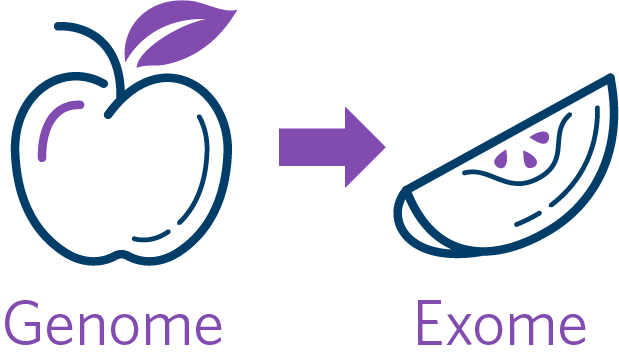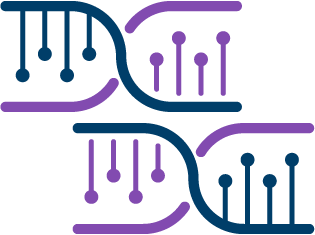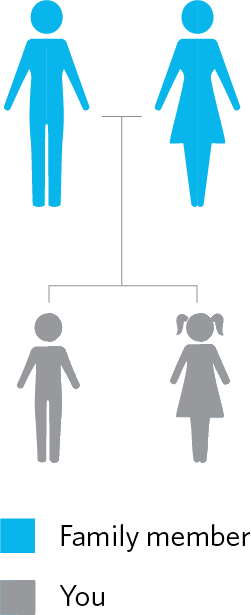Rare and Undiagnosed Conditions
Genomic testing can find answers for up to half of all people with an undiagnosed disease
What is Clinical Genomic Testing?
There are two types of genomic testing, Chromosomal Microarray (CMA) and Exome Sequencing. CMA is a test designed to look for extra or missing genetic information in your genome. For many people, these imbalances can be the cause of an existing medical condition.
Your exome is the part of your genome that makes proteins, and 85% of genetic conditions are caused by changes in the exome. Exome sequencing is a test designed to look for genetic changes (mutations) in your exome that may be the cause of an existing medical condition. Some genetic tests just look for common mutations, while others may look only for changes in common genes. In contrast, exome sequencing looks at all the genes and all the mutations in the exome, making it a more comprehensive test.

85% of genetic conditions are caused by changes in the exome

An estimated 25-30 million Americans have rare diseases*

Most rare diseases are genetic or have a genetic component*
Why is Genomic Testing Important?
By knowing the underlying genetic cause of a condition, your doctors may be able to treat and manage your health better. They may also be better able to understand if your medical condition may also affect other family members.
How Genetic Testing May Help

Your healthcare provider can give you better information about what to expect based on your genetic test results, or even provide answers for your medical concern.

The extra or missing genetic information that CMA may reveal could be the cause of your current medical condition. Identifying the cause can help your healthcare provider develop a treatment and/or action plan.

Discussing the possibilities revealed in your genetic test results may help you avoid other, potentially invasive, testing.
How Genetic Testing May Help Your Family
THE BENEFITS OF EXOME SEQUENCING AND CMA FOR FAMILIES
Comprehensive genomic testing helps sort through all your family members’ genetic changes and identifies those that are common in your family versus those that may be causing your particular medical condition. If multiple people in your family have the same medical condition, family-based genomic testing could help see which of the same genetic changes each family member has.
Testing is possible without other family members, but it does lower the chance of finding an answer. To test family members, we just need a blood or saliva sample from them.

Am I a Candidate for Genetic Testing?
YOUR DOCTOR MAY CONSIDER EXOME SEQUENCING OR CMA TO IDENTIFY THE UNDERLYING GENETIC CAUSE OF YOUR MEDICAL CONCERNS WHEN:
Previous genetic and medical tests have not determined a cause, and your doctor suspects an underlying genetic cause
There is no specific genetic testing available for your possible genetic condition
Your medical concerns may be caused by changes in more than one gene – genomic testing is a way to test for them all at once
How is Exome Sequencing or CMA Performed?

Samples sent from you (and family members in Exome Sequencing*) to the lab

Lab performs testing

Exome reports available in 8-12 weeks**
CMA reports available in 2-3 weeks

A VISIT TO YOUR HEALTHCARE PROVIDER IS THE FIRST PLACE TO START
*Your healthcare provider may identify other reasons why you could consider genetic testing.
**Family members” refers to blood relatives, such as brothers / sisters / parents / grandparents / aunts / uncles / cousins
What Test Results Can I Expect? And What Do I Do Once I Have Them?
POSITIVE, NEGATIVE, OR A VARIANT OF UNKNOWN SIGNIFICANCE (VUS)
Results from your genetic tests will fall into one of three categories:
A mutation was found that is known to be associated with your medical concerns
Genetic testing for the specific mutation may be considered for family members
The underlying genetic cause of your medical concerns has not been found
Studying your genomic data again may be helpful in the future
A DNA change(s) was found, but it is not clear if this is the cause of your medical concerns
Studying your genomic data in the future may provide useful information
SECONDARY FINDING RESULTS (FOR EXOME SEQUENCING ONLY)
A mutation was found in a gene that is unrelated to your medical concerns, but may affect your health in the future
Genetic testing for the specific gene mutation may be considered for family members
It will be important to discuss these findings with your doctor
No mutations were identified among a group of common disease genes unrelated to your medical concerns
There may still be genetic changes that may affect your future health, however they were not identified through this test

Things to Consider
Limitations
In some cases, results may be negative. Although these tests are designed to look at the entire exome/genome, the cause of your medical concerns may be in an area of the exome/genome that is not well understood or cannot be identified.
If your results are negative, your healthcare provider may choose to do additional genetic testing now or in the future. Negative results could also suggest that the medical issues you are concerned about are not inherited.
SECONDARY FINDINGS FOR EXOME SEQUENCING
Because this test looks at all your genes at once, medically important mutations may be found that have nothing to do with your current medical concerns. If this happens, you could potentially learn new information about your health, for which there may be recommended medical follow-up.
You can choose ahead of time if you wish to learn about this information.
TESTING FOR FAMILY MEMBERS
Genomic testing may find a genetic change in you that may also be found in your family. It is important to consider sharing your results; however, some family members may not want to know if they are at risk for developing a genetic condition.
Ideally, your family members should meet with their doctor or a genetic counselor to discuss their options for being tested. Genomic testing may also find unexpected information about family relationships. You can discuss these possibilities with your doctor/genetic counselor.
Tests and Gene Information
Find information about our exome and general genetics tests here. Click the arrows to expand the gene list to see all of genes that are included on each test. By clicking on each gene, you can find more information that would be important for a person who tests positive for a mutation in that gene. These Understanding Your Results pages are included with positive test reports from Ambry.
ExomeNext-Proband™
|
Whole Exome |
ExomeNext-Proband plus mtDNA
|
Whole Exome |
ExomeNext-Duo™
|
Whole Exome |
ExomeNext-Duo plus mtDNA
|
Whole Exome |
ExomeNext-Trio™
|
Whole Exome |
ExomeNext-Trio plus mtDNA
|
Whole Exome |
ExomeNext-Rapid®
|
Whole Exome |
ExomeNext-Select™
SNP Array
A genomic test that looks for causes of developmental delay, intellectual disability, autism spectrum disorders, and other pediatric health concerns.
|
Whole Genome |
Hereditary leiomyomatosis and renal cell carcinoma
MODY panel
|
GCK |
HNF1A |
HNF1B |
HNF4A |
PDX1 |
Multiple endocrine neoplasia type 1
Multiple endocrine neoplasia type 2 and familial medullary thyroid cancer
von Hippel-Lindau disease
Cystic fibrosis
RET-related Hirschsprung disease
Juvenile polyposis syndrome
Pancreatitis Panel
|
CASR |
CFTR |
CPA1 |
CTRC |
PRSS1 |
SPINK1 |
Peutz-Jeghers syndrome
SNP Array
A genomic test that looks for causes of developmental delay, intellectual disability, autism spectrum disorders, and other pediatric health concerns.
|
Whole Genome |
Noonan syndrome panel
|
BRAF |
CBL |
HRAS |
KRAS |
LZTR1 |
MAP2K1 |
MAP2K2 |
NF1 |
|
NRAS |
PPP1CB |
PTPN11 |
RAF1 |
RASA1 |
RIT1 |
SHOC2 |
SOS1 |
|
SOS2 |
SPRED1 |
DBANext™
|
RPL11 |
RPL19 |
RPL26 |
RPL35A |
RPL5 |
RPS10 |
RPS17 |
RPS19 |
|
RPS24 |
RPS26 |
RPS7 |
DCNext
|
DKC1 |
NHP2 |
NOP10 |
TERC |
TERT |
TINF2 |
WRAP53 |
Shwachman-Diamond syndrome
|
SBDS |
Congenital central hypoventilation syndrome
Cystic fibrosis
PCDNext®
A genetic test that identifies primary ciliary dyskinesia, a disorder that causes defects in the action of cilia lining the respiratory tract.
|
ARMC4 |
CCDC103 |
CCDC114 |
CCDC39 |
CCDC40 |
CFTR |
DNAAF1 |
DNAAF2 |
|
DNAAF3 |
DNAAF5 |
DNAH11 |
DNAH5 |
DNAI1 |
DNAI2 |
LRRC6 |
NME8 |
|
OFD1 |
RPGR |
RSPH4A |
RSPH9 |
SPAG1 |
Surfactant Dysfunction Panel
|
ABCA3 |
SFTPB |
SFTPC |
Telomere-related pulmonary fibrosis
|
TERC |
TERT |
HHTNext®
TAADNext®
A next generation sequencing panel that analyzes 35 genes associated with thoracic aortic aneurysms and dissections, Marfan syndrome and related disorders that often contribute to sudden cardiac death. The test can confirm a diagnosis and aid in patient management and treatment options.
|
ACTA2 |
BGN |
CBS |
CHST14 |
COL1A1 |
COL1A2 |
COL3A1 |
COL5A1 |
|
COL5A2 |
EFEMP2 |
FBN1 |
FBN2 |
FKBP14 |
FLNA |
FOXE3 |
LOX |
|
MAT2A |
MED12 |
MFAP5 |
MYH11 |
MYLK |
NOTCH1 |
PLOD1 |
PRDM5 |
|
PRKG1 |
SKI |
SLC2A10 |
SMAD3 |
SMAD4 |
TGFB2 |
TGFB3 |
TGFBR1 |
|
TGFBR2 |
TNXB |
ZNF469 |
NephrolithiasisNext
NephrolithiasisNext is a comprehensive panel for patients with symptoms of nephrolithiasis and nephrocalcinosis.
|
AGXT |
ALPL |
APRT |
ATP6V0A4 |
ATP6V1B1 |
BSND |
CA2 |
CASR |
|
CLCN5 |
CLDN16 |
CLDN19 |
CYP24A1 |
FAM20A |
GRHPR |
HOGA1 |
HPRT1 |
|
KCNJ1 |
MOCOS |
OCRL |
PRPS1 |
SLC12A1 |
SLC22A12 |
SLC2A9 |
SLC34A1 |
|
SLC34A3 |
SLC3A1 |
SLC4A1 |
SLC7A9 |
UMOD |
XDH |
Tests and Gene Information
Click on the disease or category below to see all genes that appear on the test.
-
Exome & Microarray
-
ExomeNext-Proband™
Gene List
Whole Exome
-
ExomeNext-Proband plus mtDNA
Gene List
Whole Exome
-
ExomeNext-Duo™
Gene List
Whole Exome
-
ExomeNext-Duo plus mtDNA
Gene List
Whole Exome
-
ExomeNext-Trio™
Gene List
Whole Exome
-
ExomeNext-Trio plus mtDNA
Gene List
Whole Exome
-
ExomeNext-Rapid®
Gene List
Whole Exome
-
ExomeNext-Select™
Gene List
500
-
SNP Array
A genomic test that looks for causes of developmental delay, intellectual disability, autism spectrum disorders, and other pediatric health concerns.
Gene List
Whole Genome
-
-
Endocrinology
-
Hereditary leiomyomatosis and renal cell carcinoma
Gene List
FH
-
MODY panel
Gene List
GCK, HNF1A, HNF1B, HNF4A, PDX1
-
Multiple endocrine neoplasia type 1
Gene List
MEN1
-
Multiple endocrine neoplasia type 2 and familial medullary thyroid cancer
Gene List
RET
-
von Hippel-Lindau disease
Gene List
VHL
-
-
Gastroenterology
-
Cystic fibrosis
Gene List
CFTR
-
RET-related Hirschsprung disease
Gene List
RET
-
Juvenile polyposis syndrome
Gene List
BMPR1A, SMAD4
-
Pancreatitis Panel
Gene List
CASR, CFTR, CPA1, CTRC, PRSS1, SPINK1
-
Peutz-Jeghers syndrome
Gene List
STK11
-
-
Multiple Congenital Anomalies
-
SNP Array
A genomic test that looks for causes of developmental delay, intellectual disability, autism spectrum disorders, and other pediatric health concerns.
Gene List
Whole Genome
-
Noonan syndrome panel
Gene List
BRAF, CBL, HRAS, KRAS, LZTR1, MAP2K1, MAP2K2, NF1, NRAS, PPP1CB, PTPN11, RAF1, RASA1, RIT1, SHOC2, SOS1, SOS2, SPRED1
-
-
Hematology
-
DBANext™
Gene List
RPL11, RPL19, RPL26, RPL35A, RPL5, RPS10, RPS17, RPS19, RPS24, RPS26, RPS7
-
DCNext
Gene List
DKC1, NHP2, NOP10, TERC, TERT, TINF2, WRAP53
-
Shwachman-Diamond syndrome
Gene List
SBDS
-
-
Pulmonology
-
Congenital central hypoventilation syndrome
Gene List
PHOX2B
-
Cystic fibrosis
Gene List
CFTR
-
PCDNext®
A genetic test that identifies primary ciliary dyskinesia, a disorder that causes defects in the action of cilia lining the respiratory tract.
Gene List
ARMC4, CCDC103, CCDC114, CCDC39, CCDC40, CFTR, DNAAF1, DNAAF2, DNAAF3, DNAAF5, DNAH11, DNAH5, DNAI1, DNAI2, LRRC6, NME8, OFD1, RPGR, RSPH4A, RSPH9, SPAG1
-
Surfactant Dysfunction Panel
Gene List
ABCA3, SFTPB, SFTPC
-
Telomere-related pulmonary fibrosis
Gene List
TERC, TERT
-
-
Vascular
-
HHTNext®
Gene List
ACVRL1, ENG, EPHB4, GDF2, RASA1, SMAD4
-
TAADNext®
A next generation sequencing panel that analyzes 35 genes associated with thoracic aortic aneurysms and dissections, Marfan syndrome and related disorders that often contribute to sudden cardiac death. The test can confirm a diagnosis and aid in patient management and treatment options.
Gene List
ACTA2, BGN, CBS, CHST14, COL1A1, COL1A2, COL3A1, COL5A1, COL5A2, EFEMP2, FBN1, FBN2, FKBP14, FLNA, FOXE3, LOX, MAT2A, MED12, MFAP5, MYH11, MYLK, NOTCH1, PLOD1, PRDM5, PRKG1, SKI, SLC2A10, SMAD3, SMAD4, TGFB2, TGFB3, TGFBR1, TGFBR2, TNXB, ZNF469
-
-
Nephrology
-
NephrolithiasisNext
NephrolithiasisNext is a comprehensive panel for patients with symptoms of nephrolithiasis and nephrocalcinosis.
Gene List
AGXT, ALPL, APRT, ATP6V0A4, ATP6V1B1, BSND, CA2, CASR, CLCN5, CLDN16, CLDN19, CYP24A1, FAM20A, GRHPR, HOGA1, HPRT1, KCNJ1, MOCOS, OCRL, PRPS1, SLC12A1, SLC22A12, SLC2A9, SLC34A1, SLC34A3, SLC3A1, SLC4A1, SLC7A9, UMOD, XDH
-

Useful Organizations to Know
Want to Know More About Genetic Testing?
Ambry’s current menu of genetic tests is focused in four categories of genetic disease: Hereditary Cancer, Heart Conditions, Hereditary Neurological Disorders, and Other Rare Conditions. If the condition you are concerned about falls into one of these categories, click on the appropriate button to learn more.


